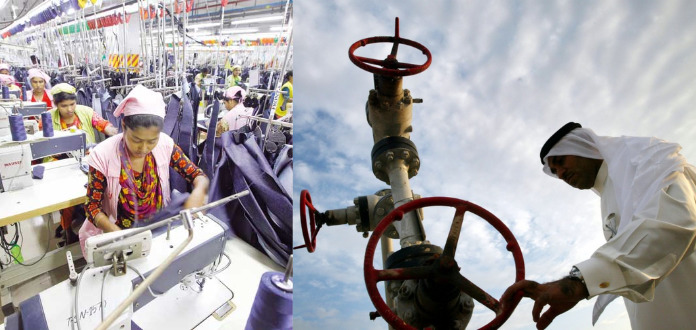Analysts across the world are still struggling to gauge the real consequences of the COVID-19 Pandemic and the related travel restrictions/ lockdowns, as it is gradually turning out to be one of the biggest shake-ups in the present world order in a long time.
One of the biggest consequences, however, is the sudden collapse of single-sector economies, that is, those countries which rely on one particular industry for economic growth.
The Arab economy that relies on oil exports, the Bangladeshi economy that relies on textiles/ apparels and the Malaysian economy that depends highly on Palm oil are all on verge of an imminent, unavoidable collapse.
Arab Countries:
The Arab world has traditionally thrived on oil exports, so much so that it has allowed the richer Gulf countries like the UAE and Saudi Arabia to prosper without the imposition of taxes. But their prosperity depends on higher oil prices, on which these countries pin their hopes for government spending and social welfare programmes.
But with Coronavirus-related lockdowns and an oil price war between Saudia Arabia and Russia, the crude oil market has crashed unprecedentedly. And so have the fortunes of the Arab world. Now, even the richer countries like Saudi Arabia, UAE, Oman, and Bahrain are feeling the heat. Saudi Arabia, the de facto leader of the Arab world, has itself felt compelled to take austerity measures- tripling Value-added tax (VAT) and cutting down on welfare expenditure.
The richer of Gulf countries that generally ran a budget surplus are now staring at double-digit fiscal deficits. For the Arab world, higher oil prices and an economic collapse also mean social unrest for countries like Iran and Iraq.
It can also lead to Arab Spring 2.0, similar to the large-scale protests for democratic rights in the early 2010s. At that time, rich countries like Saudi Arabia had escaped lightly because they were riding on economic prosperity. But as the slump in oil prices drags down the richer Gulf countries even Saudi Arabia, UAE, Oman, and Bahrain are likely to face the heat of popular protests.
Bangladesh:
Bangladesh is turning out to be another case of a rising economy getting irreparably battered due to the COVID-19 Pandemic. Not too long ago, the economy of the overcrowded country with 162 million people was growing at a staggering rate of 8 per cent not too long ago.
Its manufacturing sector was, in particular, growing strongly at a time when manufacturing failed to pick up in countries across the world.
But suddenly India’s neighbour has collapsed dramatically, as the COVID-19 Pandemic has turned out to be quite a catastrophe for the Bangladeshi economy. The country’s apparels industry has been crippled, and therefore its economy has come crashing down.
Bangladesh’s growth story was short-lived because of its over-dependence on apparel exports and lack of intent to diversify.
The garment industry alone contributes close to 80% of the country’s total exports. The textile industry of Bangladesh alone contributes about 16% to the densely populated country’s GDP.
However, with the Pandemic bringing the world economy to a grinding halt, the apparel brands and retailers have cancelled orders worth approximately $3.17 billion, pushing the textile industry of Bangladesh towards a hurtful collapse.
The lifeline of Bangladesh is its textile industry. And it is dying a slow and excruciating death
Orders getting cancelled, textile units getting shut and mass lay-offs characterise the near apocalypse that the garments industry in the country is currently grappling with.
The problem was not only the demand-side but also on the supply-side, as the textile industries had to shut down following a nationwide lockdown. Now, Dhaka is putting its economy before the lives of citizens, as the textiles industry is going to be reopened amidst the ongoing lockdown, even though the number of cases continues to rise in the country.
For a country as densely populated as Bangladesh, the decision to end the lockdown for millions of workers could trigger a fresh wave of the epidemic further compounding its troubles. Textile units, the drivers of Bangladeshi economy yesterday, could become the Coronavirus clusters of today.
By the end of the Pandemic, the apparels industry of Bangladesh would have most probably collapsed bringing an unfortunate end to the country’s growth story.
Malaysia:
Also collapsing under the weight of Coronavirus induced economic downturn is the Palm Oil-dependent Malaysian economy.
Palm oil is crucial for the Malaysian economy as it accounts for 2.8% of Malaysia’s Gross Domestic Product and 4.5% of total exports. The country also happens to be the second-largest producer of Palm Oil.
Since April, there have been ominous signs when it comes to the Palm oil imports. In fact, New Delhi had already imposed curbs on Palm Oil imports following former Malaysian Prime Minister Mahathir’s anti-India remarks. And the Pandemic has only worsened the crisis for Malaysia.
With the economic slowdown, the demand-side for Palm Oil looks really weak. India is the world’s biggest Palm Oil importer, but Malaysian Palm Oil exports to India has hit a record low.
Malaysia exported just 10,806 tons to India in March- a drop of 97 per cent from last year. Import curbs, nationwide lockdown and shuttering of restaurants that use more oil compared to home-cooked food has triggered the collapse of Palm Oil demand hurting the Malaysian economy.
There has been demand destruction in China, the second-largest importer of Palm Oil too. China is the country of Coronavirus-origin and maybe far worse affected than what the official numbers show. Demand for Palm Oil prices has thus hit a new low among the two biggest importers.
Malaysian economy faces the brunt of dropping Palm Oil demand. The prices have already gone down by 25 per cent, and with no signs of exports picking up, the stockpiles of the product will only lead to further slump in prices.
